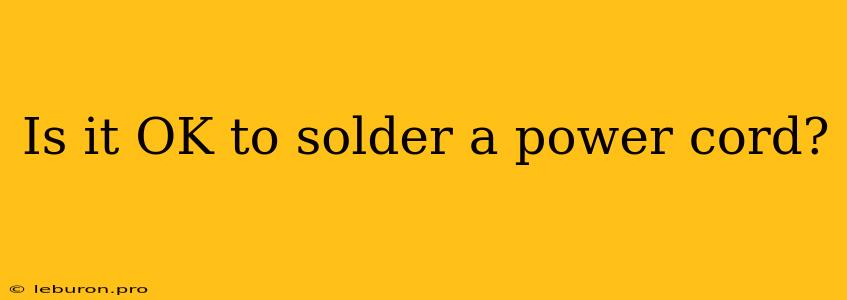Soldering a power cord might seem like a simple fix for a broken appliance, but it's a task that requires caution and expertise. While it's technically possible, it's not generally recommended for the average individual due to the safety risks involved. The act of soldering a power cord raises several concerns related to electrical safety, potential fire hazards, and the integrity of the connection. This article will delve into the reasons why soldering a power cord is typically discouraged and outline the potential risks involved.
Why Soldering a Power Cord Is Generally Discouraged
Soldering a power cord is not a typical repair method, especially for household appliances. There are several key reasons why it's generally discouraged:
Electrical Safety Concerns:
- Risk of Electrical Shock: Soldering involves working with live electrical circuits, which can be extremely dangerous. A faulty solder joint or improper insulation could lead to exposed wires, increasing the risk of electrical shock.
- Potential Fire Hazard: Soldering a power cord improperly can create a potential fire hazard. If the connection isn't secure, it could overheat, leading to melted insulation or even a fire.
- Damage to Appliances: Incorrectly soldering a power cord can damage the appliance it's connected to. This can occur if the soldering process introduces heat to sensitive components or if the connection is not made properly.
Durability and Reliability:
- Strain and Stress: Power cords are designed to be flexible and withstand movement. Soldering can make the cord less flexible and prone to breakage at the solder point, especially if the cord is frequently moved or handled.
- Long-Term Reliability: Soldering might seem like a simple fix, but over time, solder joints can weaken or become brittle due to heat and vibration. This can lead to a compromised connection and potential failures.
Alternatives to Soldering:
- Replacing the Cord: The most straightforward solution for a damaged power cord is to replace it entirely. This ensures the connection is safe and reliable.
- Using Electrical Tape: For temporary repairs, electrical tape can be used to insulate a damaged area of the cord. However, this is only a temporary solution and should not be considered a permanent repair.
When Soldering a Power Cord Might Be Acceptable (With Extreme Caution)
While soldering a power cord is generally discouraged, there are some very specific scenarios where it might be considered, but only by experienced individuals with the necessary knowledge and safety precautions:
- Specialized Electronic Devices: In some cases, soldering might be necessary for repairs on specialized electronic devices where a replacement cord isn't readily available. However, this should only be undertaken by qualified professionals.
- Low-Voltage Applications: Soldering might be acceptable for low-voltage applications where the risk of electrical shock is minimized.
Important Safety Precautions if You Must Solder a Power Cord
If you are absolutely certain you need to solder a power cord and you have the necessary expertise and experience, you must prioritize safety:
- Disconnect Power: Before soldering, always disconnect the power cord from the power source.
- Use Appropriate Tools: Employ a soldering iron with a temperature control feature. Avoid using excessively high temperatures, as this can damage the insulation.
- Insulate Carefully: After soldering, ensure the connection is properly insulated to prevent electrical shock and short circuits.
- Test Thoroughly: Always test the repaired connection before using it. Make sure there are no signs of overheating or sparking.
Final Thoughts:
Soldering a power cord is a risky undertaking that should be avoided unless you are a highly skilled and experienced electrician. The potential risks to electrical safety, fire hazards, and appliance integrity outweigh the potential benefits in most cases. If you have a damaged power cord, the best course of action is to replace it entirely. If you are unsure about the risks involved, consult a qualified electrician. By understanding the dangers associated with soldering a power cord and prioritizing safety, you can prevent accidents and ensure the safety of your home and appliances.
